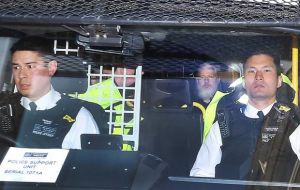MercoPress. South Atlantic News Agency
US accuses Assange of conspiracy to commit computer intrusion
 Assange gave a thumbs up in handcuffs as he was taken from a police station to a London court, where he declared himself not guilty of failing to surrender in 2012
Assange gave a thumbs up in handcuffs as he was taken from a police station to a London court, where he declared himself not guilty of failing to surrender in 2012  Police said they arrested Assange, 47, after being invited into the embassy following the Ecuadorean government’s withdrawal of asylum
Police said they arrested Assange, 47, after being invited into the embassy following the Ecuadorean government’s withdrawal of asylum British police dragged WikiLeaks founder Julian Assange out of Ecuador’s embassy on Thursday after his seven-year asylum was revoked for his extradition to the United States for one of the biggest ever leaks of classified information.
Hours after the frail-looking Assange, with white hair and a long beard, was carried head-first by at least seven men out of the embassy in London and into a waiting police van, US officials announced he had been charged with conspiracy to commit computer intrusion.
British Prime Minister Theresa May hailed the news in Parliament, to cheers and cries of “Hear, hear!” from lawmakers.
But in Washington, President Donald Trump, who in 2016 said “I love WikiLeaks” after it released e-mails that US authorities have said were hacked by Russia to harm his election opponent Hillary Clinton, told reporters he had no opinion on the charges against Assange. “I know nothing about WikiLeaks. It’s not my thing,” Mr Trump said.
Assange gave a thumbs up in handcuffs as he was taken from a police station to a London court, where he pronounced himself not guilty of failing to surrender in 2012. District judge Michael Snow called Assange a “narcissist” and convicted him of skipping bail. Sentencing will be at a later date.
Police said they arrested Assange, 47, after being invited into the embassy following the Ecuadorean government’s withdrawal of asylum. Assange was carried out of the building carrying a copy of Gore Vidal’s History Of The National Security State, which he continued reading in court.
In Washington, the US Justice Department said Assange was charged with conspiring with former Army intelligence analyst Chelsea Manning to gain access to a government computer as part of a 2010 leak by WikiLeaks of hundreds of thousands of US military reports about the wars in Afghanistan and Iraq and American diplomatic communications.
The indictment was made secretly last year and unsealed on Thursday. He faces up to five years in prison if convicted, with legal experts saying more charges were possible.
Ecuador suspended Assange’s citizenship and accused him and others at WikiLeaks of collaborating in attempts to destabilize the Andean nation’s government, after years of offering him shelter.
Lawyers for Assange said he may risk torture and his life would be in danger if he were to be extradited to the US.
The arrest, after nearly seven years holed up in a few cramped rooms at the embassy, represented one of the most sensational turns in a tumultuous life that has transformed the computer programmer into a fugitive wanted by the US.




Top Comments
Disclaimer & comment rulesCommenting for this story is now closed.
If you have a Facebook account, become a fan and comment on our Facebook Page!